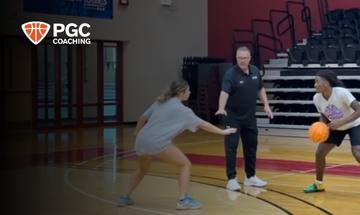7 Ways to Build a Winning Culture in Your Basketball Program
Every team wants to win. It’s why coaches pour hours into preparation and athletes stretch their physical and mental limits. But that’s not enough if you want to find consistent success. There’s a foundational element that top programs have mastered, and that’s building the right culture with intention and purpose. Because when the tough times hit, and they will, culture will be the rock that carries you through.
If you want to build a winning basketball culture, you need to create a foundation that will keep your team together during tough times. And no matter where you are with your team and season, these 7 principles will help you lay the foundation for long-term success.
But before we share the 7 principles, here are a few more tips you may want to explore as well:
- How to Build a Winning Basketball Culture: 5 Daily Habits for Coaches
- Embrace Adversity: Turning Tough Losses Into Opportunities
- 5 Principles to Transform Player Development
Anyways, here we go…
1. Program > Team > Player
Winning basketball team cultures don’t revolve around individuals—they revolve around purpose. In elite programs, the program comes first, the team second, and the player third.
This isn’t about minimizing or ignoring the individual. Instead, it’s about maximizing the impact. When players understand that the whole is greater than the sum, you’ll start to see something special unfold—unselfishness, consistency, and a drive to leave the jersey better than they found it.
2. Mistakes Are Part of the Journey
No one’s perfect. Players will mess up. Coaches will too.
But in strong basketball team cultures, mistakes aren’t final—they’re part of the process. Great programs treat mistakes as learning opportunities, not identity statements. And they remind their team often:
“You either accept it or you correct it. There’s nothing in between.”
3. Build Shared Ownership
When things go wrong, average teams point fingers. Great teams point thumbs.
Shared ownership is a cornerstone of any elite basketball team culture. That means no more “that wasn’t my man” or “we should be playing zone.” It’s our team. They scored on us.
Getting to this place takes time and teaching. But when players start owning their role in a missed rotation or failed possession, you’re building something that lasts. Start with questions like:
- “What can we do better?”
- “What role did you play in that?”
- “How can I help you next time?”
And don’t forget—coaches have to model shared ownership first.
4. Repetition Is Not Punishment
In winning basketball team cultures, repetition isn’t viewed as a consequence—it’s seen as a gift.
Repetition builds mastery. It’s how habits form. It’s how confidence grows. And it’s how your team starts to separate from others when the season hits the grind.
Teach your team to embrace the boring, to fall in love with the reps, and to see every moment as preparation for something bigger.
5. Renew Commitments Often
Every season—and every team—hits moments of conflict, adversity, and challenge. When that happens, most teams react. Great teams recommit.
You might’ve already shared ownership. You might’ve had the hard conversation. But now, it’s time to move forward. That means renewing your commitment to the team, the standard, and the mission.
- “I’m committed to better communication.”
- “I’m committed to playing with more energy.”
- “I’m committed to being on time.”
It doesn’t matter whether it’s a new commitment or a renewed one. What matters is that it’s owned and followed up. Daily.
6. Discipline = Love
Discipline isn’t about control—it’s about care.
Being on time, doing the extra rep, staying accountable, speaking up in the locker room… none of that is about rules. It’s about love. When your players understand that discipline is an expression of love—for the team, for each other, for the game—you’ll start to see buy-in rise and blame fall.
And here’s the truth: if you aren’t prepared to put the team first, don’t play.
7. Believe or Leave
Every player, every coach, every manager… they need to buy into the vision. Because belief is what sustains a culture when the season gets hard.
If you’re building a winning basketball team culture, set the tone early:
- We believe in our standard.
- We believe in each other.
- And we believe in where we’re headed.
And if someone doesn’t? They may need to find another program that aligns better. As we often say:
Believe or leave.
FAQ: Building a Winning Basketball Team Culture
Q: Why does “Program > Team > Player” matter in building basketball culture?
A: This principle reminds everyone that no single player is bigger than the mission. It promotes unselfishness, team-first decisions, and long-term consistency. In great basketball programs, players understand that their legacy grows when they serve something bigger than themselves.
Start every season by sharing this priority hierarchy—and remind your team that purpose drives performance.
Q: How do you help players see mistakes as learning opportunities?
A: Normalize mistakes in your culture by saying things like, “You either accept it or correct it.” Use film sessions and practices to teach—not shame—players. Emphasize progress over perfection, and model this mindset as a coach when you make mistakes too.
Build a growth mindset by highlighting “corrections” in every post-practice review—not just wins and losses.
Q: What is shared ownership, and how do you build it?
A: Shared ownership means everyone takes responsibility for the outcome—no blaming, no excuses. It starts with questions like:
- “What could we have done better?”
- “What’s your part in that?”
When players stop pointing fingers and start pointing thumbs, real culture begins.
Use reflection circles or quick post-practice “ownership shares” to create a safe space for accountability.
Q: Why should repetition be viewed as a gift, not a punishment?
A: Repetition is how muscle memory and mastery are built. In elite cultures, players view drills as opportunities, not consequences. When your team understands that “boring” work builds confidence and consistency, their mindset—and performance—elevates.
Reframe repetition as preparation, and celebrate effort-based reps just as much as made shots.
Q: How often should teams recommit to their values and standards?
A: Daily. Winning programs regularly revisit their commitments—especially after adversity. Whether it’s a mid-season slump or a heated locker room moment, recommitting to your standard reinforces unity, clarity, and growth.
Use weekly “commitment check-ins” where players declare one action they’ll take to lift the team.
Q: How do you teach players that discipline equals love?
A: Explain that discipline is a form of investment—not punishment. Saying “be early,” “sprint through the line,” or “hold the standard” shows players that you believe in their potential. It builds trust and mutual respect when done with care and consistency.
Pair expectations with encouragement. Let your players hear the “why” behind every standard you hold.
Q: What should a coach do if a player doesn’t believe in the team’s mission?
A: Be clear and compassionate: belief is non-negotiable. Invite players into the vision, but if someone consistently resists the team’s direction, it may be time for a tough conversation. Culture is upheld by those who believe—even when it’s hard.
Have 1-on-1 belief conversations early in the season. Ask: “Do you believe in what we’re building?”
Q: What are signs your team culture is trending in the right direction?
A: Look for:
- Unprompted communication
- Player-led accountability
- Consistent practice energy
- Players investing in each other
When the team holds the standard without constant coach intervention, your culture is thriving.
Track culture wins weekly—like great huddles, pick-ups after drills, or “above and beyond” efforts.
Q: How do you get new players to buy into team culture?
A: Set the tone early and often. Use returning players to model behavior. Make culture visible through shared language, rituals, and standards. Let new players contribute by naming how they’ll show belief and commitment.
Start with a team culture session—then ask each player to define how they’ll “leave the jersey better.”
Q: Where can coaches find more resources to build basketball team culture?
A: The PGC Coaching Community is a great place to connect with like-minded coaches, access proven leadership strategies, and implement culture-building tools that actually work under pressure.
Join the PGC Coaching Community and start building the culture you’ve always wanted. Grab a 7 day FREE trial today.
Your program’s culture won’t build itself…
… But with the right tools, language, and leadership, you can shape a foundation that wins far beyond the scoreboard. Want support from other coaches walking the same path? We’ve got a community ready to help.
If you’d like to explore even more resources just like this, grab a free 7-day trial to get access to our members-only content.
TJ
Check more practice transformational coaching fundamentals here.
About the Author
TJ Rosene
Coach TJ Rosene, head coach of the Emmanuel University men’s basketball team and Director of Coach Development for PGC Coaching, has spent his career shaping young athletes both on and off the court. With over 400 career wins and 12 seasons of 20+ wins, Rosene’s coaching experience is extensive and impressive. His teams have competed in six national championship games, winning three NCCAA National Championships. Under his leadership, the Lions made their NCAA Division II debut in 2018-19 and quickly captured two season titles and one tournament title, along with an appearance in the NCAA Division II Sweet 16 in 2021./p>
Rosene’s success expands far beyond the scoreboard. He’s been named National Coach of the Year three times and Conference Carolinas Coach of the Year twice. But for Coach Rosene, the most meaningful part of his work is the lasting impact he has on his players’ lives. As he puts it, “Coaching is a rare opportunity to shape and mold the lives of young people. It’s a privilege that I never take for granted.”
New Here?
Get coaching tips and tools like these delivered to your inbox each week!
Join the 15,000 coaches we’ve assisted…

Related Articles
Embrace Adversity: Turning Tough Losses Into Opportunities
Turn tough losses into wins. Learn how DEFTH helps coaches lead through adversity and build unstoppable teams.
How to Build a Winning Basketball Team Culture: 5 Daily Habits for Coaches
Build a winning basketball culture with simple daily habits. Use SCHAPE to develop toughness, connection, and leadership on your team.
How to Teach On-Ball Defense That Actually Works in Games
Build lockdown defenders with 5 simple on-ball habits every coach needs to teach. Start winning more defensive battles today!
About PGC
PGC Basketball provides intense, no-nonsense basketball training for players and coaches. Our basketball camps are designed to teach players of all positions to play smart basketball, be coaches on the court, and be leaders in practices, games and in everyday life.
We combine our unique PGC culture with a variety of teaching methods and learning environments to maximize the learning potential of those that attend our sessions. In addition to spending 6-7 hours on the court each day, lessons will be reinforced through classroom sessions and video analysis.
Our goal at PGC is to empower you with the tools to fulfill your basketball dreams, while also assisting you in experiencing the joy of the journey.
To learn more about PGC Basketball, including additional basketball training tips and videos, visit our YouTube Channel or find us on Facebook, Instagram, and Twitter.




Share This Post